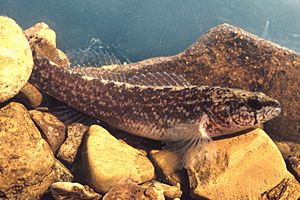Relict darter facts for kids
The
Quick facts for kids Relict darter |
|
|---|---|
 |
|
| Conservation status | |
| Scientific classification |
|
| Kingdom: | Animalia |
| Phylum: | Chordata |
| Class: | Actinopterygii |
| Order: | Perciformes |
| Family: | Percidae |
| Genus: | Etheostoma |
| Species: |
E. chienense
|
| Binomial name | |
| Etheostoma chienense Page & Ceas, 1992
|
|
| Script error: The function "autoWithCaption" does not exist. | |
Script error: No such module "Check for conflicting parameters".
The relict darter (Etheostoma chienense) is a very rare type of fish that lives in fresh water. It's a small fish, part of a group called darters. These fish are related to perches. The relict darter is found only in Kentucky, USA. Specifically, it lives in a river system called the Bayou du Chien. Because it's so rare, it is listed as an endangered species in the United States.
Contents
What the Relict Darter Looks Like
The relict darter can grow to be about 7.2 centimeters (about 2.8 inches) long. When the male darters are ready to breed, they grow special "lollipop-like" white bumps on their second back fin. This unique feature helps scientists identify them.
Where the Relict Darter Lives
This special darter is only found in a small part of the Bayou du Chien river. This river is a smaller stream that flows into the Mississippi River in Kentucky. Relict darters like to hide in places where the riverbank is undercut. This means the water flows under a mat of tree roots. The bottom of the river in these spots is usually sand and gravel covered with fallen leaves. This kind of hiding spot is very important for them. However, these perfect habitats are not found everywhere in the river. There are often long stretches of river between good hiding places.
What the Relict Darter Eats
Relict darters mainly eat insects. They are good at finding small bugs in the water.
How the Relict Darter Reproduces
When relict darters reproduce, the female fish lay their eggs. They stick these eggs to the underside of sticks and rocks in the river. So far, scientists have only found one area where these fish are known to lay their eggs.
Why the Relict Darter is Endangered
The relict darter is an endangered species because it lives in only one small river system. This river has changed a lot over time. There are not many good places left for the darters to live or lay their eggs. Farming activities and changes made to the river, like making it straighter and deeper (called channelization), have hurt their natural home. These changes make it harder for the relict darter to find safe places to live and reproduce.
See also
 In Spanish: Etheostoma chienense para niños
In Spanish: Etheostoma chienense para niños
 | Shirley Ann Jackson |
 | Garett Morgan |
 | J. Ernest Wilkins Jr. |
 | Elijah McCoy |


